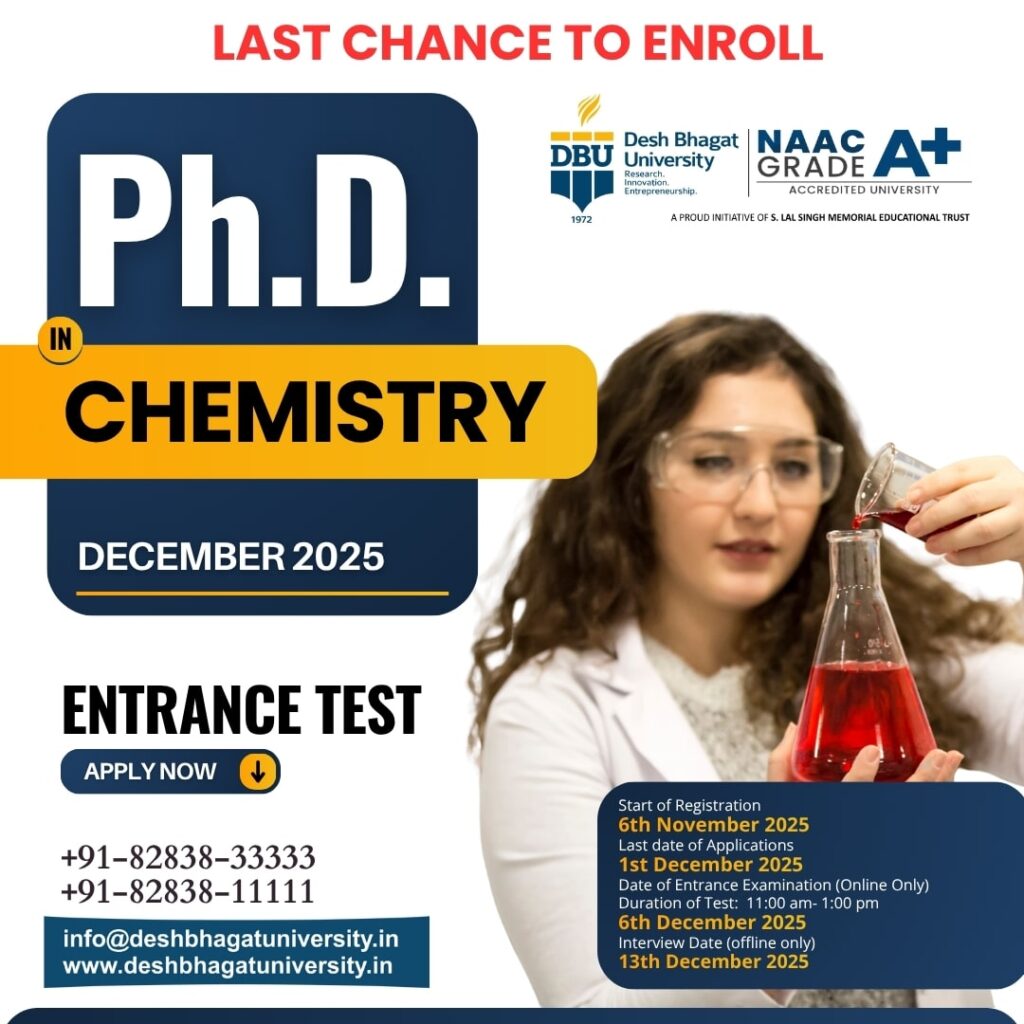PhD in Chemistry in India: Eligibility, Career, Admission 2026
July 15, 2025 2025-11-06 8:07PhD in Chemistry in India: Eligibility, Career, Admission 2026

PhD in Chemistry in India: Eligibility, Career, Admission 2026
A Ph.D. in Chemistry is one of the highest academic qualifications that individuals can pursue in the field of chemistry. It is designed for those who wish to specialize in various areas of chemistry, contribute original research to the field, and pursue careers in academia, industry, or research. Desh Bhagat University (DBU), located in Mandi Gobindgarh, Punjab, offers a comprehensive Ph.D. program in Chemistry that aims to provide students with the skills and knowledge needed to succeed in the rapidly evolving world of scientific research.
In this article, we will explore the Ph.D. in Chemistry program at DBU, including its eligibility criteria, admission process, duration, research opportunities, career prospects, and salary expectations for Ph.D. graduates in India.
What is a Ph.D. in Chemistry?
A Doctor of Philosophy (Ph.D.) in Chemistry is a research-based program that focuses on creating original contributions to the field of chemistry. Unlike undergraduate or master’s degrees that provide foundational knowledge, a Ph.D. allows students to delve deeply into specialized areas of chemistry, such as organic chemistry, inorganic chemistry, physical chemistry, analytical chemistry, environmental chemistry, and medicinal chemistry.
The Ph.D. program is not just about learning existing theories but about developing new ideas and methods that can advance the understanding of chemical processes and reactions. This involves rigorous research, experimentation, and critical analysis.
At Desh Bhagat University, the Ph.D. in Chemistry program is structured to prepare students for both academic and industry roles by offering them the necessary tools to conduct high-level research.
Eligibility Criteria for Ph.D. in Chemistry at DBU
Before applying for the Ph.D. in Chemistry at DBU, it’s important to meet the university’s eligibility criteria. The requirements are designed to ensure that candidates are well-prepared to undertake research in chemistry.
1. Educational Qualifications
Candidates must have a Master’s degree in Chemistry or a related field from a recognized university. The degree should be obtained with at least 55% marks. For candidates from reserved categories such as SC/ST, there is a relaxation of 5%, so they can apply with 50% marks.
2. National-Level Examinations
Candidates who have cleared national-level examinations like UGC-NET, CSIR-NET, or GATE are exempt from appearing for the university’s entrance examination. These exams test the candidate’s basic understanding of chemistry and research methodologies, and candidates who have qualified for them are considered highly capable of undertaking research.
3. Direct Admission after Bachelor’s Degree
In some cases, candidates with a Bachelor’s degree (B.Sc. or equivalent) and a strong academic record (minimum 75% marks) are also eligible to apply directly for the Ph.D. program. They must pass the National Eligibility Test (NET) to be considered for admission. This allows exceptional students to enter the program early and gain more time for their research.
Admission Process for Ph.D. in Chemistry at DBU
The Ph.D. admission process at DBU is designed to identify the most capable candidates for advanced research. It is conducted in two stages: an entrance test and an interview.
1. Entrance Test
The first stage is the entrance examination, which is designed to assess a candidate’s knowledge in several areas. The exam has four sections:
- Research Methodology (30 marks): This section tests a candidate’s understanding of research methods, data analysis, and scientific writing.
- Functional English Language (15 marks): This section evaluates the candidate’s ability to communicate effectively in English, which is essential for writing research papers and conducting global research collaborations.
- Functional Knowledge of Computers (15 marks): Since research in chemistry often involves using various software tools for data analysis and simulations, this section assesses the candidate’s basic knowledge of computers.
- Core Subject Knowledge in Chemistry (40 marks): This is the most important section, as it tests the candidate’s depth of knowledge in various branches of chemistry, such as organic, inorganic, physical, and analytical chemistry.
The exam is conducted online, and there is no negative marking, so candidates are encouraged to attempt all the questions.
2. Interview
Candidates who pass the entrance test are shortlisted for an interview. The interview is the second stage of the selection process and provides an opportunity for the candidate to present their research interests and ideas. During the interview, candidates are asked to:
- Discuss their research interests and why they want to pursue a Ph.D. in Chemistry.
- Explain how their research will contribute to the field of chemistry.
- Evaluate the feasibility of their proposed research and how they plan to carry it out.
The final selection is based on the combined performance in the entrance test and the interview. This ensures that only the most promising candidates are selected for the program.
Duration of Ph.D. in Chemistry at DBU
The duration of the Ph.D. program in Chemistry at DBU is flexible.
- The minimum duration for completing the program is three years.
- The maximum duration is six years.
This flexibility allows students to conduct thorough research, experiment, and gather data without the pressure of completing their dissertation too quickly. The extended timeline also accommodates students who may need additional time for research or coursework.
Coursework
During the first semester, all Ph.D. students are required to complete coursework. The coursework is designed to provide a foundation in research methodology, emerging trends in chemistry, and the ethical aspects of research. It also helps students stay updated with the latest developments in chemical sciences.
If a candidate has already completed an M.Phil. program in Chemistry and studied research methodology, they may be exempt from taking the coursework. However, students who completed their M.Phil. through distance education or part-time modes are not exempted.
Research Areas in Ph.D. in Chemistry at DBU
The Ph.D. in Chemistry at DBU offers students the opportunity to conduct research in various specialized areas of chemistry. Some of the major research areas include:
- Organic Chemistry: The study of carbon-containing compounds, their structure, reactions, and properties.
- Inorganic Chemistry: The study of inorganic compounds, including metals, minerals, and salts.
- Physical Chemistry: The study of chemical reactions and processes from a molecular perspective.
- Analytical Chemistry: Techniques and methods used to identify and quantify substances in various samples.
- Environmental Chemistry: The study of chemical processes occurring in the environment and their effects on human health and ecosystems.
- Medicinal Chemistry: The design and synthesis of chemical compounds for therapeutic purposes.
- Polymer Chemistry: The study of polymers, large molecules made up of repeated units, and their properties.
- Nanotechnology: The manipulation and design of materials at the nanoscale to create new materials with unique properties.
DBU’s state-of-the-art laboratories and research facilities support these areas of research, allowing students to carry out experiments, analyse results, and contribute to the scientific community.
Career Opportunities for Ph.D. Graduates in Chemistry
A Ph.D. in Chemistry from DBU opens up a wide range of career opportunities in both academia and industry. Some of the potential career paths include:
1. Academia
Many Ph.D. graduates in Chemistry choose to enter academia and work as professors, assistant professors, or researchers in universities and colleges. They can teach undergraduate and graduate students, supervise research projects, and contribute to the advancement of chemical sciences through their research.
2. Research and Development (R&D)
Ph.D. holders can work in R&D departments of pharmaceutical companies, chemical industries, and research institutions. In these roles, they may work on the development of new drugs, materials, and technologies.
3. Government Research Organizations
In India, there are several prestigious government organizations like ISRO (Indian Space Research Organisation), DRDO (Defence Research and Development Organisation), and CSIR (Council of Scientific and Industrial Research) that employ Ph.D. graduates in Chemistry for research roles. These organizations are at the forefront of scientific innovation in the country.
4. Quality Control and Assurance
Ph.D. graduates can also work in the quality control departments of chemical industries, ensuring that products meet safety standards and regulations.
5. Entrepreneurship
With their advanced knowledge, Ph.D. holders can start their own companies or consulting firms in various fields such as environmental protection, material science, and pharmaceutical development.

Ph.D. in Chemistry Salary in India
The salary of a Ph.D. in Chemistry graduate varies depending on the industry, role, and experience. On average, a fresh Ph.D. graduate in Chemistry can expect to earn between ₹6 to ₹9 lakhs per year. However, this can increase with experience, specialization, and the nature of the employer.
- Academia: A university professor with a Ph.D. in Chemistry can earn around ₹7 to ₹10 lakhs per annum.
- Industry (Pharmaceutical, Chemical, etc.): Ph.D. graduates working in R&D or quality control can expect salaries ranging from ₹8 to ₹12 lakhs per year.
- Government Research: Research positions in government organizations like ISRO or DRDO may offer salaries between ₹8 to ₹15 lakhs per year, depending on the candidate’s experience and position.
Entrance Exams 2025
| Event | Date | Time / Notes |
|---|---|---|
| Start of Online Registration | July 9, 2025 | |
| Last Date to Fill Online Application | July 28, 2025 | |
| Entrance Examination (Online) | August 2, 2025 | 11:00 am – 1:00 pm |
| Result of Entrance Examination | August 5, 2025 | |
| Interview (Offline Only) | August 9, 2025 | 10:00 am – 1:00 pm Venue: Mahapragya Hall, DBU Campus |
| Result of Interview | August 9, 2025 | 03:00 pm |
| Students Biometric Registration | August 9, 2025 | From 03:00 pm onwards |
| Fee Deposit Begins | August 9, 2025 | From 03:30 pm onwards |
| Last Date for Fee Deposit | August 18, 2025 |
Conclusion
A Ph.D. in Chemistry from Desh Bhagat University is an excellent opportunity for those looking to contribute to the advancement of chemical sciences through research. With its well-structured program, flexible duration, and strong focus on research, DBU provides the perfect platform for aspiring chemists. Whether you want to enter academia, research, or industry, a Ph.D. in Chemistry will equip you with the skills and knowledge needed to succeed in a wide variety of roles.
By completing a Ph.D. in Chemistry at DBU, you can take your career to new heights and make significant contributions to the world of science and technology.
FAQs
1. What is a Ph.D. in Chemistry?
A Ph.D. in Chemistry is a research-focused academic program where students work on original projects to advance the field of chemistry. Students study various branches like organic, inorganic, physical, and environmental chemistry, aiming to make new discoveries. This program prepares students for research, teaching, and industry roles.
2. What are the eligibility criteria for a Ph.D. in Chemistry at DBU?
To apply for the Ph.D. in Chemistry at DBU, you need a Master’s degree in Chemistry with at least 55% marks. If you have qualified national-level exams like UGC-NET, CSIR-NET, or GATE, you are exempt from the entrance test. In some cases, candidates with a Bachelor’s degree and 75% marks may also apply directly.
3. How long does it take to complete the Ph.D. in Chemistry at DBU?
The Ph.D. in Chemistry at DBU takes a minimum of 3 years and a maximum of 6 years to complete. This duration gives students enough time to conduct thorough research and write their dissertations. Students can work at their own pace, ensuring that their research is of the highest quality.
4. What does the Ph.D. admission process involve at DBU?
The admission process for the Ph.D. in Chemistry at DBU includes two main stages: an entrance exam and an interview. The entrance exam covers research methodology, chemistry fundamentals, and English. If you pass the exam, you will attend an interview where you discuss your research interests and proposed topic.
5. What are the key research areas for a Ph.D. in Chemistry at DBU?
DBU offers several research areas for a Ph.D. in Chemistry. These include Organic Chemistry, Inorganic Chemistry, Analytical Chemistry, Environmental Chemistry, Medicinal Chemistry, Polymer Chemistry, and Nanotechnology. Students can choose a specialized field based on their interests and career goals.
6. Are there any exemptions from the entrance examination for Ph.D. candidates?
Yes, candidates who have already qualified for national-level exams like UGC-NET, CSIR-NET, or GATE are exempt from taking the entrance exam at DBU. These exams demonstrate a high level of understanding of chemistry and research methods, making candidates eligible for direct admission to the interview stage.
7. What is the coursework like for a Ph.D. in Chemistry at DBU?
Ph.D. students at DBU are required to complete coursework during the first semester. This coursework covers research methodology, emerging trends in chemistry, and research ethics. It provides foundational knowledge for conducting high-level research. Students who have finished an M.Phil program may not need to take some courses.
8. What career opportunities can I pursue after completing a Ph.D. in Chemistry?
After earning a Ph.D. in Chemistry, graduates have various career options. You can become a professor or researcher in universities and colleges, work in R&D departments of chemical industries or pharmaceutical companies, or join government organizations like ISRO or DRDO. You could also start your own company or consultancy in chemistry.
9. What is the salary expectation for Ph.D. Chemistry graduates in India?
The salary for a Ph.D. in Chemistry graduate in India can range from ₹6 to ₹9 lakhs per year for entry-level positions. However, the salary can increase with experience and specialization. In academia, salaries may start at ₹7 to ₹10 lakhs, while industry roles may offer higher salaries depending on the company and role.
10. How can I apply for the Ph.D. program in Chemistry at DBU?
To apply for the Ph.D. in Chemistry at DBU, you need to visit the official university website ( https://www.admissions.deshbhagatuniversity.in/ ) and submit an online application form. You will need to provide your academic details, research proposal, and relevant documents. Ensure you meet the eligibility requirements before applying and pay the necessary application fee.






